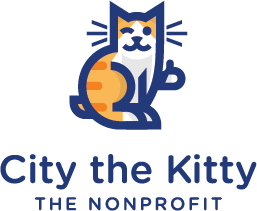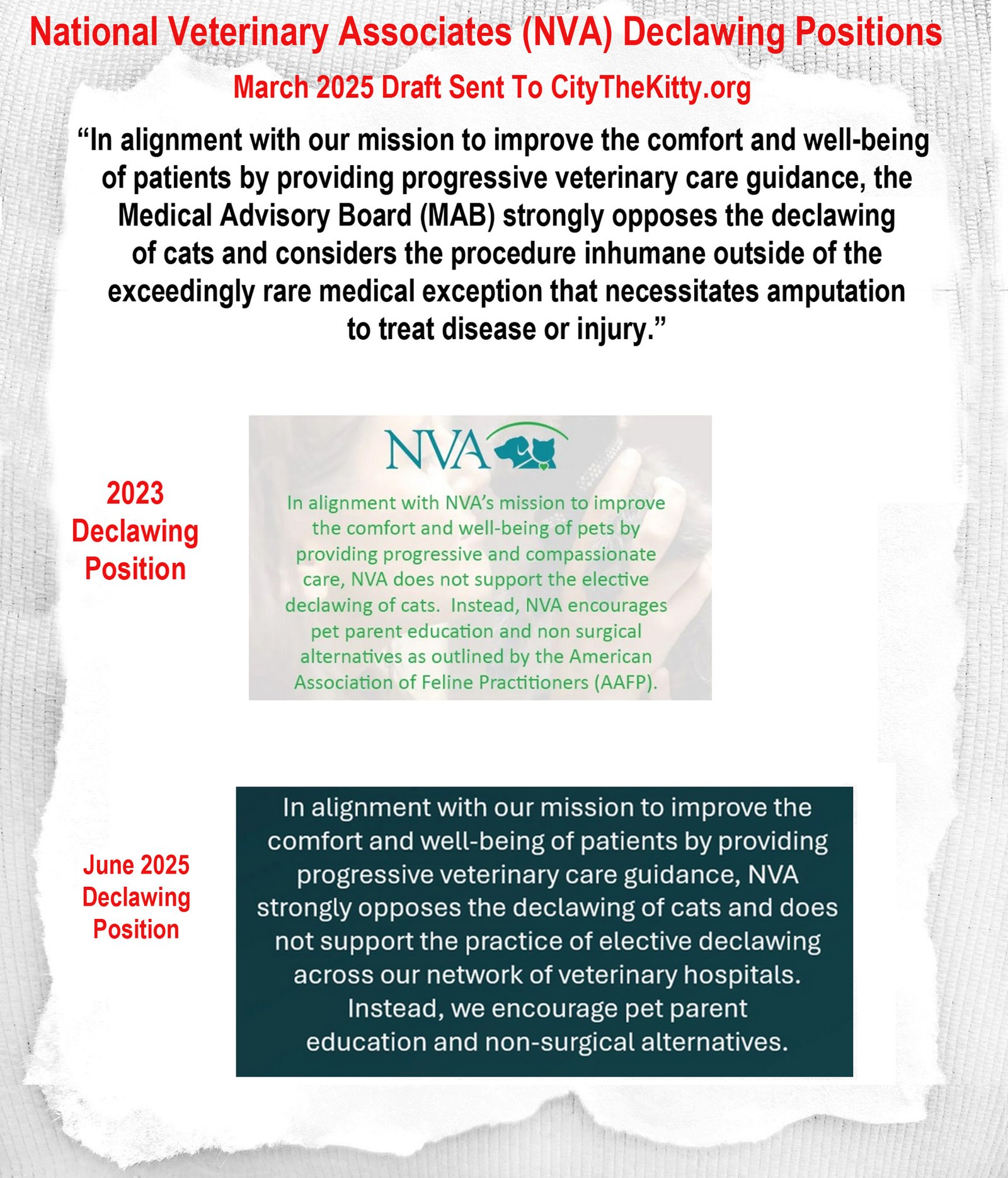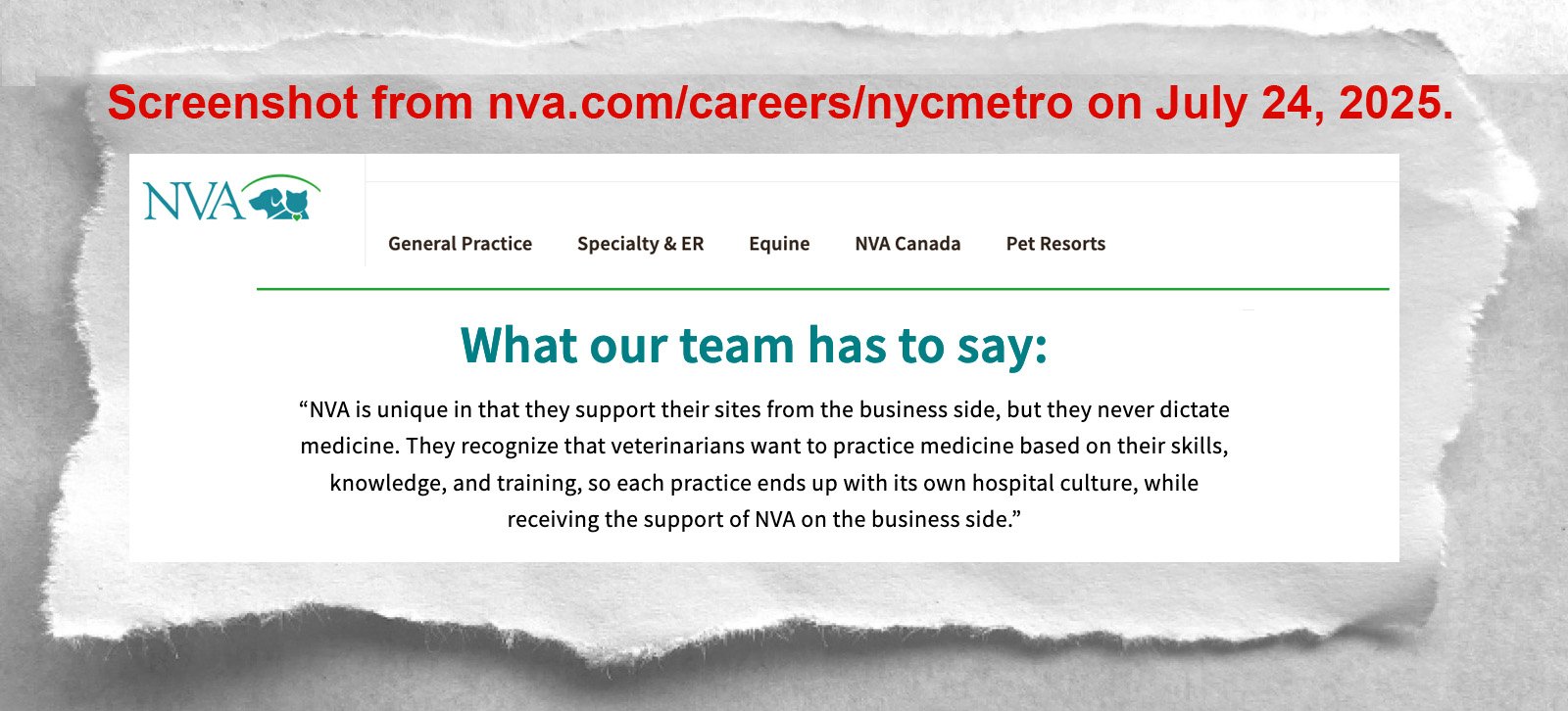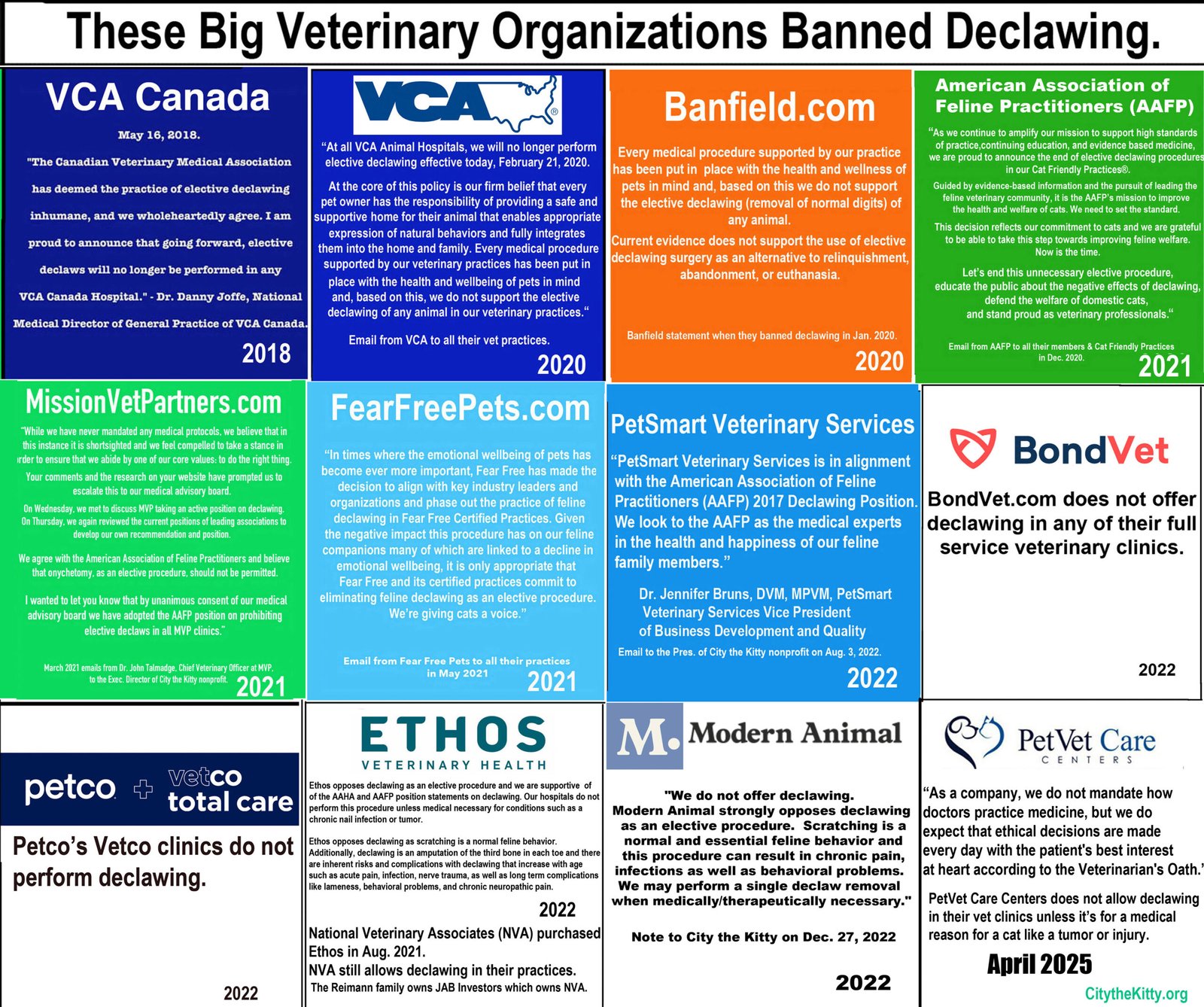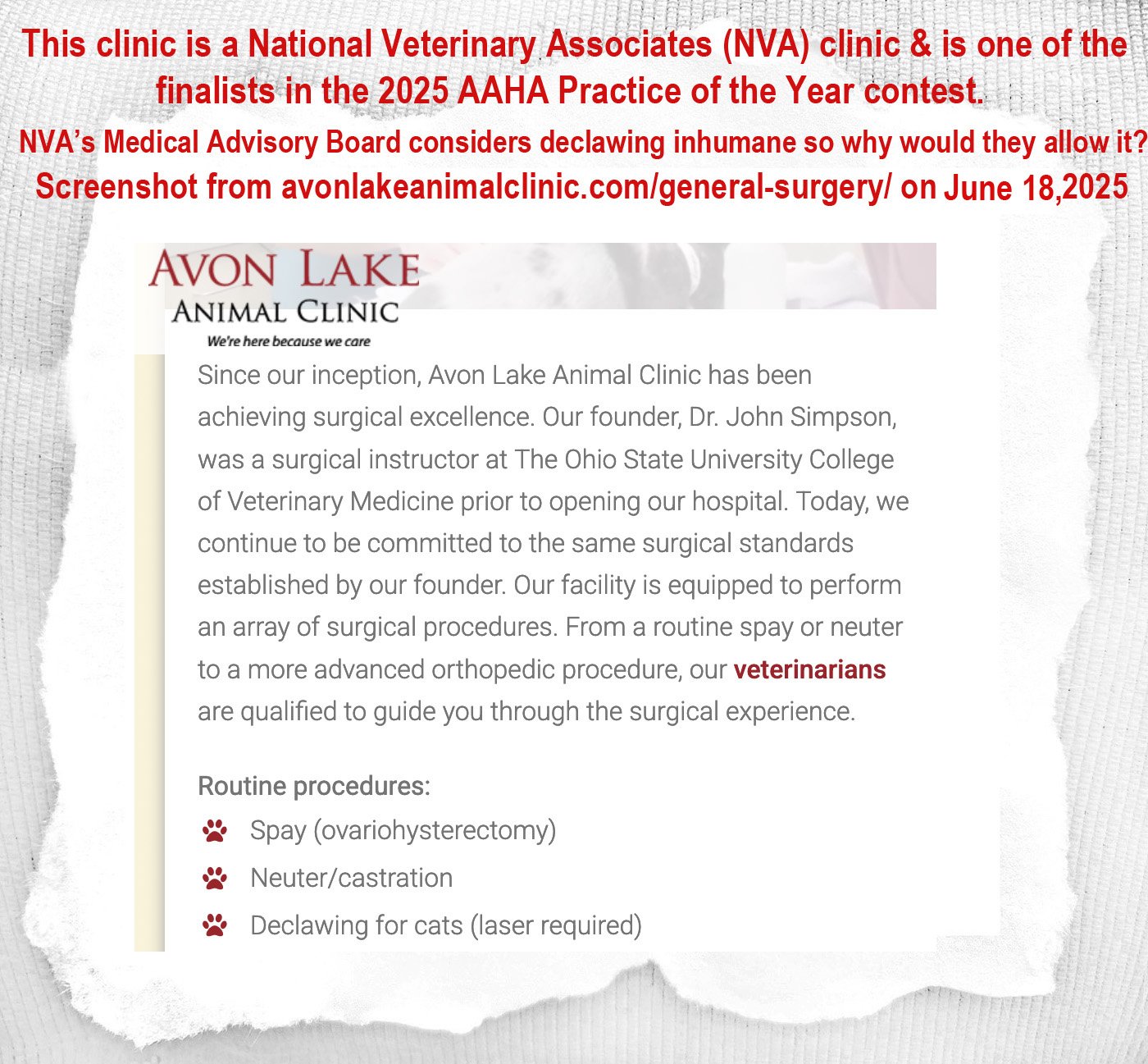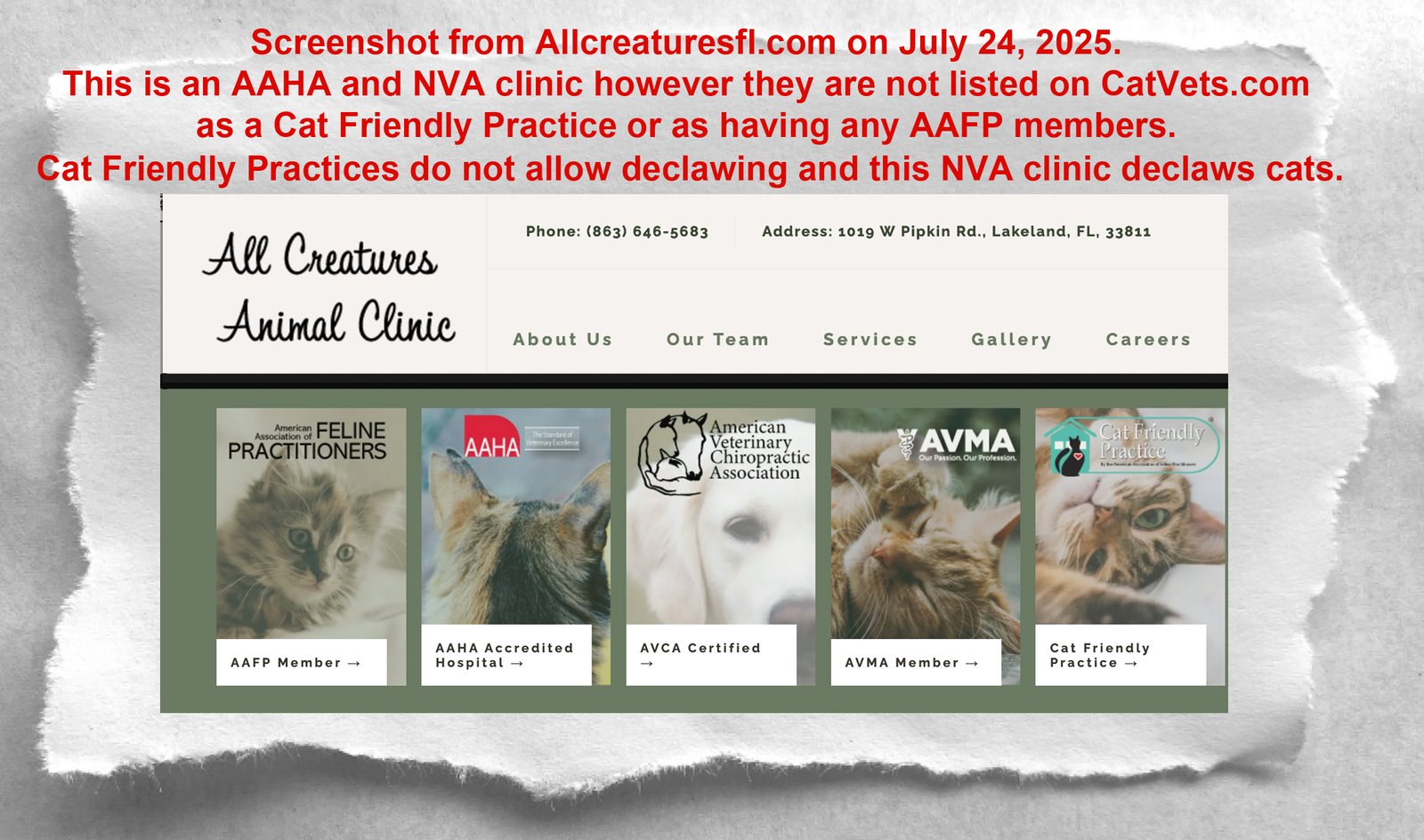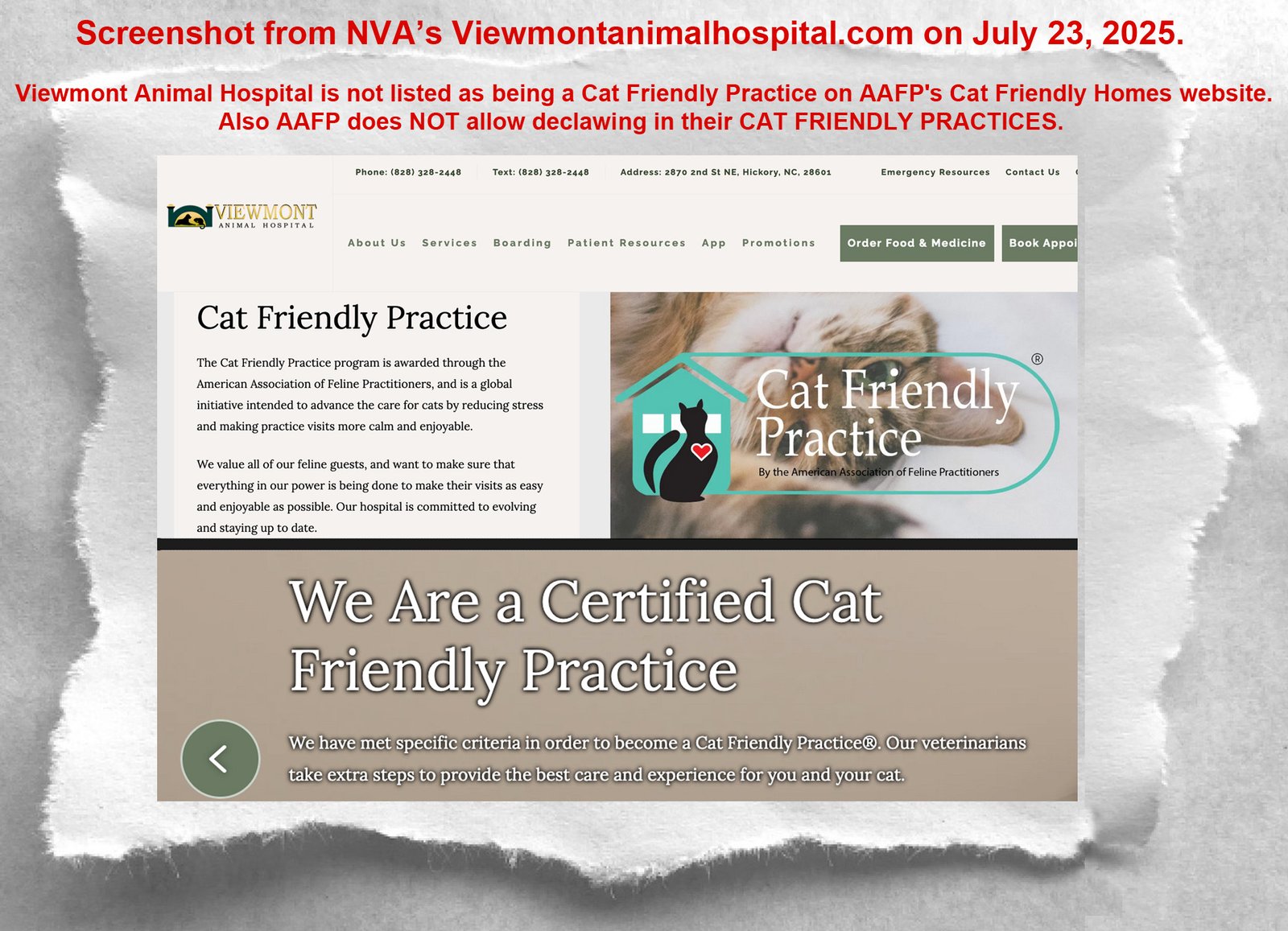UPDATE FEBRUARY 3, 2026.
Feb. 3, 2026
This is a HISTORIC moment for the welfare of cats: after nearly six years since City the Kitty launched its campaign urging National Veterinary Associates (NVA) to stop allowing declawing, the second-largest veterinary group in America, has officially declared declawing inhumane and banned it across all NVA practices, including in their clinics in Canada, effective February 1, 2026– setting a clear, uncompromising, science-based standard that puts the welfare of cats first and shows what true ETHICAL leadership in veterinary medicine looks like.
NVA’s new CEO, John Bruno, personally reached out to City the Kitty’s President a few weeks ago after receiving one of our emails, engaging directly on this issue. She helped NVA craft a strong, principled, no-loopholes policy that puts the welfare of cats above profits and “medical autonomy” excuses, will save thousands of cats from being mutilated, and reduce moral injury among veterinary professionals, and will move the entire profession forward. This was also made possible by the voices and persistence of City the Kitty’s supporters, who truly helped make the difference.
Now it’s time to give National Veterinary Associates and their new CEO, John Bruno, huge accolades for doing the right thing! Here is their contact form! https://www.nva.com/contact-us
Here is NVA’s new declawing policy that they sent to all their vet clinics on Feb. 3, 2026.
“GP teams,
I’m writing to share a new NVA position on feline elective declawing that aligns with our commitment to progressive care and patient welfare. This will now be the position for all NVA operations, including Ethos and Canada.
New NVA Position to our Clinics – Effective February 1, 2026:
As part of our commitment to progressive, evidence-based veterinary care, NVA has aligned on a clear position regarding feline elective declawing. NVA opposes and prohibits feline elective declawing across our practices. The procedure is considered inhumane except in medical circumstances where amputation is necessary to treat disease or injury. Instead, we recommend pet parent education and non-surgical alternatives to manage scratching behavior.
Why We’re Making This Change:
This decision came after thoughtful collaboration with veterinarians across our organization, including members of our MAB and SAB, and industry partners. As a company committed to evidence-based medicine, the research has made it clear that elective declawing creates risks of chronic pain, behavioral issues, and mobility problems. With mounting evidence of long-term harm to feline patients, we determined this is the right step forward for modern, compassionate medicine and animal welfare.
As a progressive leader in veterinary medicine, we recognize that five states and over a dozen municipalities have already banned elective declawing, reflecting a significant shift in both public policy and veterinary standards. For example, New York became the first state to ban declawing in 2019, followed by Maryland, New Jersey, and most recently California in 2025, and a resolution was introduced in the U.S. Congress late last year.
Important Context:
This clinic position establishes a minimum standard of care grounded in a strong body of evidence demonstrating that elective declawing causes significant short- and long-term harm to cats. It does not restrict medical independence—rather, it ensures our practices align with or exceed standards set by leading experts in feline welfare.
What This Means for Our Teams:
Client Education is Key: All team members should be prepared to discuss scratching post options, nail trimming, temporary nail caps, pheromone products, and deterrents in a kind and respectful manner.
Medical Exceptions: Onychectomy may still be performed when medically necessary. Tendonectomies are also not acceptable.
Compassionate Conversations: Clients seeking declawing may be misinformed or frustrated. Our approach should be educational and supportive, not judgmental, to help them find better solutions for their cats.
Resources Available:
For complete details, including client education materials, product recommendations, and FAQs…
Office Hours: We’ll be hosting office hours for hospital leaders (MDVMs and HMs) to answer questions:
Friday, February 6: 10–11am CT
Monday, February 9: 7–8pm CT
Friday, February 20: 1–2pm CT
The calendar invites will be shared with hospital leaders directly.
If you have questions about individual cases or need additional guidance, please contact the Medical Advisory Board at mab@nva.com.
Thank you for your continued dedication to providing exceptional, progressive care to our patients and their families.
Sandra Faeh, DVM
Chief Medical Officer, NVA General Practice”
—————————————————————————————————————————————————————–
Story published July 24, 2025
From Nazi-Era Profits to Cat Mutilation: Reimann Family’s Veterinary Company, NVA, Allows Declawing Despite Calling It Inhumane
National Veterinary Associates (NVA)—owned by the billionaire Reimann family through JAB Holding Company—told the public it opposed elective declawing. They even drafted a policy in 2025 calling declawing “inhumane.” But when it came time to act, they erased that word, watered down their stance, and quietly left the door open for their 1,400 hospitals to keep profiting from this brutal amputation.
Today, many NVA clinics—including AAHA award finalists—still declaw cats, sometimes on all four paws, sometimes on older cats, and often by relief vets with no relationship to the animal. This is not compassion or progress—it’s mutilation for profit. NVA veterinarians earn commissions on the revenue they generate, making declawing not just tolerated but financially incentivized.
The Reimanns’ family spokesman once promised, “The whole truth must be put on the table” about their Nazi-era profits from human cruelty. Yet their veterinary empire continues a different kind of cruelty—silencing truth, betraying values, and allowing cats to suffer for cash.
NVA lied. Declawing continues. And the Reimanns’ legacy of suffering didn’t end—it just changed its victims.
Background.
In 2019, the spokesman for the billionaire Reimann family said in a news story, “The whole truth must be put on the table” in regards to the Reimann family’s ancestors profiting from human cruelty and suffering and supporting the Nazi regime.
Here’s the truth about how that legacy of cruelty continues in, NVA, their veterinary company today.
Through the Reimann’s investment firm JAB Holding Company, they own National Veterinary Associates (NVA), the largest private owner of freestanding veterinary hospitals in the U.S. with over 1,400 clinics.
JAB also owns many popular brands like Krispy Kreme, Panera Bread, Peet’s Coffee, Noah’s Bagels, Keurig and many more big companies.
NVA continues to allow the cruel, mutilating practice of declawing cats, despite their own Medical Advisory Board—led by Chief Veterinary Officer Dr. Sandra Faeh—stating in a March 2025 declawing position draft that said, “The Medical Advisory Board (MAB) strongly opposes the declawing of cats and considers the procedure inhumane outside of the exceedingly rare medical exception that necessitates amputation to treat disease or injury.”
Dr Faeh is also the 2025 President of the American Veterinary Medical Association (AVMA).
That declawing draft was developed with help from the nonprofit CitytheKitty.org.
But in June 2025, NVA quietly published a watered-down version of their draft declawing policy on their website, removing the word “inhumane” and softening its stance, sent the position to their vet clinics in July 2025.
Many of NVA’s vet clinics continue to perform and profit from declawing—an amputation procedure banned in the Reimanns’ native Germany and across Europe due to its painful and harmful consequences for cats. Declawing involves surgically removing the last bone of each toe and can lead to chronic pain, lameness, and behavioral issues. It is banned in five U.S. states, many American cities, and eight Canadian provinces.
NVA says on their website, “We’re committed to progressive and compassionate care, narrowing the health gap with wellness plans, veterinary dentistry and fear-free healthcare experiences for patients and their families.” Yet they allow the cruel, inhumane, antiquated, non-therapeutic, mutilating amputation procedure in their vet clinics.
In contrast, Ethos Veterinary Health—which joined NVA in August 2021—does not allow declawing except for rare medical reasons for the cat.
In a 2022 response to CitytheKitty.org, Ethos stated, “Hi there, we got a response back for you from our Regional Medical Director: “Ethos opposes declawing as an elective procedure and we are supportive of the AAHA and AAFP position statements on declawing. Our hospitals do not perform this procedure unless medical necessary for conditions such as a chronic nail infection or tumor. Ethos opposes declawing as scratching is a normal feline behavior. Additionally, declawing is an amputation of the third bone in each toe and there are inherent risks and complications with declawing that increase with age such as acute pain, infection, nerve trauma, as well as long term complications like lameness, behavioral problems, and chronic neuropathic pain.”
Ethos says on their website, “Committed to revolutionizing veterinary medicine, Ethos sets the standard in veterinary excellence.”
Unlike NVA, Ethos and their clinics back this stance with action.
NVA was acquired by JAB Holding Company in 2019. At the time, NVA CEO Greg Hartmann praised the deal, calling JAB “strong supporters of our mission of providing progressive and compassionate care.”
David Bell, partner at JAB, echoed the sentiment, claiming their strategy was to “support and invest in veterinarians and animal care teams” and to provide “the very highest level of veterinary care.”
But those words now ring hollow, says CitytheKitty.org.
“NVA’s own medical board called declawing inhumane. and NVA erased that word, silenced the truth, and is letting the cruelty and suffering continue. When executives like Hartmann and Bell speak of ‘high-level care’ and ‘compassion,’ while their clinics barbarically amputate cat toes for profit or weak excuses, their words aren’t just hollow—they’re a betrayal of every value they pretend to uphold.”
Today, JAB Holding claims a commitment to ethics and integrity in its Whistleblower Policy. Yet, they’ve done nothing to stop declawing in their clinics, despite repeated outreach from CitytheKitty.org.
CitytheKitty nonprofit first contacted JAB and NVA in 2020. JAB said someone would respond—no one did. In 2022, the group also contacted the Reimanns’ Alfred Landecker Foundation, which funds human rights causes to address the family’s Nazi-linked past.
That same year, NVA posted a new declawing policy on their website claiming it did not support elective declawing. In an email to CitytheKitty.org in November 2022, NVA wrote:
“We are proud to share NVA has adopted a stance very similar to the German law… We do not support elective declawing and it should not be performed.”
But internal documents revealed that wasn’t true.
NVA’s “Feline Declaw Information & Resource Guide,” dated July 2022, that was sent to all NVA clinics allowed declawing if a veterinarian deemed it “required for the benefit of the patient.”
NVA’s declawing policy language created a loophole allowing vets to justify declawing for weak excuses like if an owner threatened to surrender or euthanize their cat or has a health issue like thin skin. But veterinary experts agree these threats don’t justify declawing—especially since studies show declawed cats are actually more likely to be abandoned due to behavioral issues like biting, anxiety, and litter box avoidance that they develop from the pain and discomfort in their mutilated paws, disproving the myth that declawing saves lives or keeps a cat in a home.
All the big human health agencies, like Center for Disease Control, the US Public Health Service, the National Institutes of Health, and infectious disease experts do not recommend declawing to prevent human illness.
In regions where declawing is banned, including New York State, Los Angeles, and in Canada, data shows that shelter intake has not increased—disproving the myth that bans put cats at risk.
Humane alternatives like nail trims, vinyl caps, scratch posts, and deterrent sprays are widely available, and every major feline welfare group agrees: scratching is natural, not a reason for surgical mutilation.
NVA veterinarians are paid a base salary plus commission on any revenue they generate above monthly targets. This pay structure can financially incentivize procedures like declawing, which often cost hundreds of dollars.
 In 2024, NVA’s new communications director contacted CitytheKitty.org to address this issue. The nonprofit provided evidence and input, leading to the 2025 draft policy that called declawing “inhumane.”
In 2024, NVA’s new communications director contacted CitytheKitty.org to address this issue. The nonprofit provided evidence and input, leading to the 2025 draft policy that called declawing “inhumane.”
But when the final version went public, the term was gone.
While 12 other major vet companies, including VCA and PetVet Care Centers have banned declawing entirely, NVA still allows it under the guise of veterinary medical autonomy.
However, many of these big veterinary companies that banned declawing have the same type of operating model as NVA.
Here’s what VCA said to all their vet clinics in 2020 when they informed them that declawing is no longer allowed in VCA clinics.
“In our 33-year history since the inception of VCA we have rarely mandated anything related to medical practice. Our goal has always been to practice high quality medicine and we have invested heavily in educational programs, hospital facilities and equipment to help ensure that our doctors and hospital support teams are able to practice at a high level. We have always kept the bar high and we have strived to support our hospitals to enable their success. Areas where we have set strong policies include following current practices in analgesia and anesthesia, pre-anesthetic lab screening recommended for all patients, and patient safety guidelines implemented at all hospitals. The basis for all of these policies has been to do what is in our patients’ best interest. Patient safety and welfare always come first.
We have prided ourselves that VCA doctors and hospitals observe best practices. Our doctors have been given the freedom on how they practice medicine, as long as what is being done falls into a range of accepted standards of care. We no longer feel that elective declawing of cats is a best practice and we must be cognizant of the negative effects declawing can have on cats.”
As of July 2025, many NVA clinics— including 2 finalists for AAHA.org’s Practice of the Year Contest—are still performing declawing, some are even performing 4 paw declaws.
Veterinary professionals, who worked at NVA clinics that declaw cats, have contacted CitytheKitty.org, describing the horrific suffering of declawed cats that they saw and their own moral distress from being forced to participate in and witness what they view as torture and cruelty.
“The Reimann’s companies have been contacted and the Reimanns are still allowing this barbaric animal cruelty in their company’s vet clinics,” said the CitytheKitty founder. “Their foundation claims to stand for justice and compassion. But their actions speak louder.”
“The Reimanns’ legacy of suffering didn’t end—it just changed its victims.”
(Here’s one of the many stories about the shocking details on how the Reimann family’s ancestors and their cruelty in the 1940’s that was published in the Guardian,)
Here is our NVA story that was published in 2021. https://citythekitty.org/national-veterinary-associates-nva-lied-about-declawing-what-else-are-they-lying-about/
Here is our random declawing survey of NVA vet clinics in May and July of 2025.
We wanted to see how NVA vet clinics address declawing, so our researchers made a short phone call to ask how much they charge for a declaw, if they do them regularly, and if declawing is ok for a cat long term, and who is their declawing veterinarian.
Out of 19 vet clinics we surveyed in May and July of 2025, 12 of them declaw cats. Only 36% of them do NOT declaw cats.
We have withheld the names of employees for fear that they might suffer a backlash for their honest answers.
(By refusing to ban declawing, National Veterinary Associates (NVA) is complicit in a cruel procedure that harms cats for profit. Many NVA clinics have stopped declawing because they prioritize the welfare of cats, aligning with NVA’s core values of progressive, compassionate care and the highest standard of veterinary practice. Those that continue, however, are ignoring modern veterinary ethics and the overwhelming body of research showing that declawing causes lasting physical and psychological harm to cats, including chronic pain, behavioral issues, and long-term mobility problems. Studies have demonstrated that declawing is not only inhumane but can lead to permanent changes in a cat’s gait, increased aggression, and difficulty using the litter box, all of which severely diminish their quality of life. NVA vets earning commissions on the revenue they generate, including from declawing. In doing so, NVA not only allows this outdated practice but financially incentivizes it, rewarding those who choose profit over animal welfare.)
May 2025.
These are the two NVA clinics that are finalists in AAHA’s 2025 Practice of the Year Contest and according to employees who work there, they both declaw cats.
Avon Lake Animal Clinic. Avon Lake, OH
https://avonlakeanimalclinic.com/general-surgery/
This NVA clinic removed the “Declawing for cats (laser required) from their Routine Procedures section after we published this story.
Researcher asked for the cost of a neuter/declaw and the employee said you have to speak to a doctor for the cost of a declaw.
The employee said Dr Haddad and Dr Lamb perform their declaws.
Researcher asked if the cats are ok long term after a declaw and the employee said, “Yes, absolutely.”
Carson Valley Veterinary Hospital, Gardnerville, NV
Researcher asked for the cost of a neuter/declaw and the employee said a 2 paw declaw/neuter is around $860.88- $1356.88 and a 4 paw declaw/neuter is $914- $1400.10.
The employee said that they have 14 doctors and only 5 of them will perform declaws.
Dr Saponas, Dr Mannan, Dr Warner, Dr Nelson, and Dr Ross do their declaws and said some will only declaw 2 paws and some will declaw all four paws.
The researcher asked if the cats are ok long term afterwards and the employee said, “A lot of doctors are going away from doing declaws. It’s just something that people are moving away from.”
They said as far as they know the cats are alright but that it could inhibit their life if they get out and that’s why a lot of people are against declawing because they want the cat to be able to protect themselves.
July 2025.
1. All Creatures Animal Clinic. Lakeland, FL. AAHA accredited hospital.
This job description is on NVA’s website says this clinic is also a Cat Friendly Practice, “Come join All Creatures Animal Clinic, a 7-doctor, AAHA-accredited, Cat-Friendly practice…”
All Creatures Animal Clinic also has the Cat Friendly Practice logo and AAFP member on their website however on AAFP’s website, there are no veterinary professionals listed and All Creatures is not listed as a Cat Friendly Practice. AAFP does NOT allow declawing in Cat Friendly Practices or with their member veterinarians.
Their Facebook page says, “AAHA-accredited companion animal hospital, providing both proficient and advanced quality care & service.”
Researcher asked for the cost of a neuter/declaw and the employee said that they can’t give out costs on the phone. The researcher asked if they do the neuter and declaw together and the employee said, “We can yes. We do just the front.” They said they use the older declaw method and don’t use a laser.
Researcher asked which vets do the declaw and the employee said, “Anyone of these vets would be happy to do it, to be honest.”
Researcher asked if they are skilled at the declaw and if the cats are ok after it and the employee said yes.
Researcher asked who the surgeon is for the declaw that they recommend to people and the employee looked it up on the computer said that Dr Kimble who is their medical director and Dr Tidwell.
Dr Kimble’s profile says she is a proud member of the American Association of Feline Practitioners (AAFP) however she is not listed as a member on their website and AAFP doesn’t allow their member vets to declaw cats. (AAFP changed their name to Feline Veterinary Medical Association.)
Researcher asked if they do them regularly and the employee said yes. Researcher asked if the cats are ok after the declaw and the employee said sometimes they have to stay overnight.
2) Bay Pines Veterinary Clinic. Harbor Springs, MI.
The employee said they don’t declaw cats and said their sister NVA clinic, Lake Street Veterinary Clinic, Boyne City, MI can perform declaws. The employee said that Dr Kurt Erxleben is the vet at Lake Street Vet clinic that performs the declaws.
3) Lake Street Veterinary Clinic, Boyne City, MI
The researcher asked for the cost of a neuter and declaw. The employee asked, “And you’re going to do the neuter and the declaw at the same time?” They said it’s cheaper to do them together because you only have to use anesthesia once and said a neuter/2 paw declaw is $635. The researcher asked who is their declawing vet and they said Dr Kurt Erxleben , who is the owner of this clinic. The employee said you can make an exam with Dr Erxleben and he can answer all the questions about the declaw. The researcher asked if he’s a surgeon and if the cats are alright after the declaw and the employee said, “Absolutely, he’s amazing. Yea, absolutely.” Researcher asked if he does declaws regularly and the employee said, “Yes, for 35 years. Yep. They spend the night, go home the next day.”
The researcher asked for the cost for a declaw for a 6 year old cat and the employee asked, “Two paw declaw?” The employee said a two paw is $588. Researcher asked for the cost of a 4 paw declaw for the 6 year old cat and the employee said it is $650.
4. Westridge Animal Hospital. Texarkana, TX
The researcher asked for the cost of a neuter and declaw. The employee said a neuter is $128 and then asked, “Did you want just two paws or four paws?” The employee said that a two paw declaw is $275 and a 4 paw declaw is $350.
The researcher asked how they perform the declaws and if the cats are ok long term after a declaw and an employee asked a vet tech how they perform the declaws and they said that it depends on the veterinarian. They said, “One of the doctors, he just clips them and another doctor goes in and fully cuts it out from the knuckle.” and said that declawing can be good for long term or like the cat will be ok long term and said there’s really more cons than pros to declawing.
They said that there are more reasons to not declaw a cat, it’s just cosmetic, and said if you don’t want your cat to have claws that’s just fine.
The researcher asked if there’s an age limit for a declaw what vet do they recommend for a declaw and the employee said Dr Morgan and said she uses a scalpel. They said that they have an age limit of about 8 months to a year old.
Researcher asked if Dr Morgan does declaws regularly and they said yes.
They use Elanco’s Zorbium which is a topical pain med that goes on the cat’s neck and lasts for around 4 days. Elanco is making a lot of money from declawing.
The employee was asked which pain meds they use for declaws and they said they would ask a vet tech and came back on the line and said, “We use a medicine called Rimadyl and Zorbium. So, Rimadyl is an injectable they get during surgery and then Zorbium they get afterwards, and it’s a topical.”
According to 4 veterinarians, Rimadyl is not indicated for use on cats and is actually dangerous for them.
The use of Rimadyl for a cat declaw qualifies as malpractice with what is known in veterinary medicine.
One of the veterinarians said this, “We know that carprofen (Rimadyl) is NOT an appropriate NSAID for cats, period, and there are two drugs labeled for use in cats for perioperative/surgical pain, which makes using something other than meloxicam or Onsior WAY outside the bounds of appropriate medicine.”
An estimated clinic price (not client price) for a single injection dose for an 8 pound cat for each of those pain meds is:
Carprofen (Rimadyl): $0.75
Onsior: $3.15
Meloxicam (generic): $0.42
5. East Suburban Animal Clinic, Northland, Ohio
The researcher asked for the cost of a neuter and declaw. The employee said a neuter/declaw is $460. You need to get an exam to make sure your cat is “nice and healthy” and talk to you about the declaw and as long as everything checks out, they will do the declaw for you. They said that all of their veterinarians can do the declaw.
Researcher asked if the cats are OK after a declaw. The employee said, “ It’s kind of coming out of grace. “ There’s been studies and they will talk to you about it.
Researcher are asked if they do declaws regularly and if the cats are OK and the employee said yes.
6. Animal Hospital of Worthington. Ohio.
The employee said they don’t do declaws because it’s considered inhumane nowadays so a lot of practices aren’t doing them.
7. Animal Medical Center. Hattiesburg, Mississippi.
Researcher asked for the cost of a neuter and declaw and the employee said the low end cost of a declaw is $578 and a neuter is $250.
They said that any of their doctors can do a declaw, but they recommended Dr. Calhoun.
Researcher asked if they do declaws regularly and the employee said, “Yea, we do them pretty regularly. “
Researcher asked if the cats are OK after a declaw and the employee said, “Oh yeah. I don’t know, it depends. It’s a personal choice, just like anything else.”
8. Family pet Hospital. Clarksville, Tennessee. AAHA accredited Animal Hospital.
Researcher asked for the cost of a neuter and declaw. The employee said that they cannot give a price over the phone and said, “We only offer declawing in the front paws, not the back.”
They said that they have a vet who does their declaws, but they will only do the front and that is Dr. Jim Burchett.
Researcher ask if they do declaws regularly and the employee said they don’t do a ton of declaws but he has done several in his days. They said it’s not something they get requests for often.
Researcher asked if the cats are OK after the declaw and the employee said there are some concerns that go with declaws in general, like behavioral issues in the future which is why a lot of places don’t do it. They said can send you some information.
9. Honneger Animal Clinic. Ossian, IN
10. Viewmont Animal Hospital. Hickory, North Carolina.
Their website says they are a Cat Friendly Practice however AAFP does not allow declawing in their Cat Friendly Practices. Also, Viewmont Animal Hospital is not listed as being a Cat Friendly Practice on AAFP’s Cat Friendly Homes website. They have one veterinarian who is listed as being a Cat Friendly Veterinarian and member of the Feline VMA.
They said that they typically don’t declaw and you have to have a special need for that.
They said declawing is not good for cats and there are lots of emotional and physical disadvantages so you have to have a medical reason for your cat to be declawed.
Researcher asked they meant a medical reason like if you have thin skin and you don’t want to get scratched and the employee said yes.
They said that it’s very hard to find a clinic that will declaw cats anymore.
They said that you need to get an exam first and you also need a note from your doctor for the medical reason.
11. SAHO Owasso Animal Hospital. Owasso, Oklahoma.
The employee said that a neuter/front or hind declaw is around $722.50. They said a hind declaw (back feet) is not as common as the front one but they give you the choice.
They said a four paw declaw with a neuter is $1072.50.
Researcher asked who’s their veterinarian that performs the declaws and the employee said, “We’ve got Dr. Walsh , he’s the one that prefers to do all of our declaws” and said he’s well experienced. The employee said that they use a laser, “just to make sure there’s no particles or anything left behind.”
Researcher asked if Dr Walsh does declaws regularly and the employee said, “he does, he’s actually the surgeon we prefer to schedule them with. “
They said that Dr. Kelly can also do declaws but Dr. Walsh does most of them.
Researcher asked if the cats are OK long-term after their declaws and the employee said, “Oh yeah, they can discuss some risks that come with declawing” but said that the laser is the best option and there are no particles or remnants of the bone left behind like what could happen in the past when they would go in and pull or cut the claws out.
They said you can discuss the risks or side effects with the doctor or the surgical nurse and reiterated that the surgical laser is the best option.
12. McClintock Animal Care Center, Tempe, AZ
The employee said that they don’t declaw cats. Researcher asked why and they said that a lot of clinics nowadays aren’t going to declaw because it’s like taking off their fingers and it can be really painful.
13. Animal Hospital of Lubbock. TX
The employee said that a neuter/declaw is $500. They said their two vets perform their declaws. Researcher asked what the cost is for a declaw for a 5 year old cat and the employee said it’s $350.
Researcher asked if the cats are OK after a declaw and if their vets perform declaws regularly and the employee said yes to both.
14. Animal Kingdom Pet Hospital. League City, TX
They do not declaw cats. Researcher asked if declawing is bad for cats and they said yes.
15. Jefferson Road Animal Hospital. Kokomo, IN
They do not declaw cats. The researcher asked why they don’t declaw and the employee said that it’s part of their accreditation and they don’t recommend it. The employee went over how declawing is a painful elective procedure that find is rarely medically necessary, they offered to provide alternatives to declawing, and said they don’t recommend declawing.
They said that most practices don’t declaw cats anymore.
16. Animal Care Clinic North. Elkhart, IN
The employee said they don’t declaw cats. The researcher asked why they don’t declaw and the employee said that a lot of doctors in general practice are getting away from declawing a cat. Researcher asked if declawing is bad for a cat and the employee said that there are different opinions on it and modern medicine has gotten away from declawing.
They said that the only clinic that still declaws is the Cat Care Clinic in Mishawaka, IN however this cat clinic said they do not declaw cats and haven’t declawed cats for at least 5 years.
17. Elmhurst animal Hospital. Illinois.
The employee said they don’t declaw cats and said that it’s not really humane because they cut them off at the first knuckle and it’s not good for the cat and it affects how they walk.
Readers are encouraged to sign CitytheKitty.org’s petition to the Reimanns and NVA. No need to donate to change. org to sign it as they keep the money.
Please email the Reimann family who owns NVA.com this note.
“Dear Reimann family,
Please ban declawing in your NVA vet clinics.
NVA’s Medical Advisory Board considers declawing inhumane so WHY would they allow it? Cruelty against humans AND animals is wrong!”
Mail@AlfredLandecker.org
Also send the same note to NVA’s Chief Veterinary Officer Dr Sandra Faeh who is also the AVMA’s President. Sandra.Faeh@NVA.com and their CEO- larry.allgaier@nva.com
